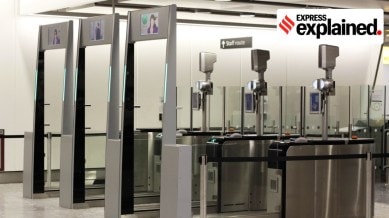Mahender Singh Manral is an Assistant Editor with the national bureau of The Indian Express. He is known for his impactful and breaking stories. He covers the Ministry of Home Affairs, Investigative Agencies, National Investigative Agency, Central Bureau of Investigation, Law Enforcement Agencies, Paramilitary Forces, and internal security. Prior to this, Manral had extensively reported on city-based crime stories along with that he also covered the anti-corruption branch of the Delhi government for a decade. He is known for his knack for News and a detailed understanding of stories. He also worked with Mail Today as a senior correspondent for eleven months. He has also worked with The Pioneer for two years where he was exclusively covering crime beat. During his initial days of the career he also worked with The Statesman newspaper in the national capital, where he was entrusted with beats like crime, education, and the Delhi Jal Board. A graduate in Mass Communication, Manral is always in search of stories that impact lives. ... Read More
Explained: For easing international travel, the new Fast Track Immigration – Trusted Traveller Programme
Registered travellers will be able to scan their boarding pass and passport at airport e-gates. After biometric authentication, the gates will automatically open, granting immigration clearance. Here is how.

Union Home Minister Amit Shah will inaugurate the Fast Track Immigration – Trusted Traveller Programme (FTI-TTP) at Mumbai, Chennai, Kolkata, Bengaluru, Hyderabad, Cochin and Ahmedabad airports on Thursday (January 16) from Ahmedabad. This comes seven months after the FTI-TTP was launched at the Indira Gandhi International (IGI) Airport in New Delhi.
According to the government, it is aimed at making international travel easy and secure. World-class immigration facilities will be developed through an accelerated immigration pathway for international travellers, who will be screened through automated gates. Here is all you need to know.
When did the government launch FTI-TTP?
FTI-TTP is one of the key agendas set by the Centre for ‘Viksit Bharat @2047’ – India becoming a developed nation by the centenary of its independence.
It was first deployed in June 2024 at Terminal 3 of the IGI Airport to facilitate international mobility with faster, smoother and more secure immigration clearance for Indian Nationals and Overseas Citizens of India (OCI) passengers arriving from other countries. In the initial phase, it was for Indian nationals and OCI cardholders on a gratis basis, that is, free of cost for all passengers. The Bureau of Immigration under the Ministry of Home Affairs is the nodal agency for programme implementation.
How does FTI-TTP work?
FTI-TTP has been implemented through an online portal (https://ftittp.mha.gov.in). To enrol in the programme, the applicant has to register online by filling in their details and uploading the required documents. After necessary verification, a white list of ‘Trusted Travellers’ will be generated and fed for implementation through e-gates.
Biometrics of the ‘Trusted Traveller’ passing through e-Gates will be captured at the Foreigners Registration Office (FRRO) office or at the time of passage of the registered traveller through the airport. The TTP registration will be valid until the validity of the passport or five years, whichever is earlier, and will be renewed thereafter.
Under the process, as soon as the registered passenger reaches the e-gates at the airport, they have to scan their boarding pass issued by the airlines at the e-gates to get the details of their flight.
“The registered passenger has to scan their boarding pass issued by the airlines at the e-gates and then scan their passport. The biometrics of the passenger will be authenticated at the e-gates. On such authentication, the e-gate will open automatically and immigration clearance will be deemed to have been granted,” said Minister of State for Home Affairs, Bandi Sanjay Kumar in a written reply to a question in the Lok Sabha.
Which documents are required for FTI-TTP?
The applicants registering for the FTI-TTP are instructed to upload a passport-size photograph. It should meet the same standards as that of an Indian passport, the applicant’s face (including ears) should take up 3/4 of the area in the image. It should be no more than six months old and the backdrop of the shot should be a simple white.
They must also submit a scanned copy of their passport having at least six months of validity, the front page comprising photo and personal information and the final page giving family details. For OCI cardholders, a scanned copy of the OCI card – both the first page (with biographic details) and the last page (family and address details), separately, is required.
How will the FTI-TTP be implemented?
The programme will be implemented in two phases. The first will cover Indian citizens and OCI cardholders and in the second phase, foreign travellers will be covered. In total, it will be implemented at 21 major airports in the country. The first phase will include the airports covered on Thursday.